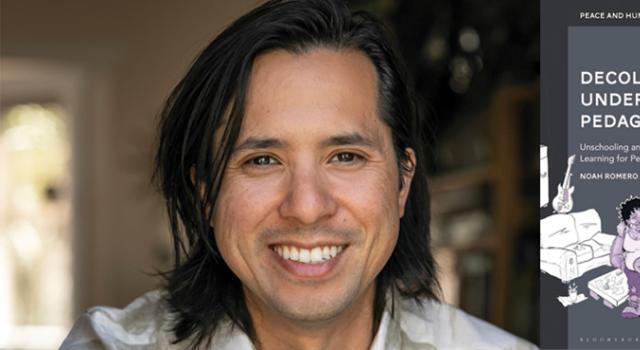
Noah Romero

Noah Romero (Filipinx - Ilocano/Visaya) holds a Ph.D. from Waipapa Taumata Rau (the University of Auckland) in the fields of Critical Studies in Education and Māori and Indigenous Education.
Bridging critical Indigenous studies and education, Romero's research examines how dispossessed and deterritorialized people redefine learning and identity in subcultural contexts, with a focus on Indigenous and immigrant communities in the U.S., Aotearoa (New Zealand), the Philippines, and the Philippine diaspora.
Romero has won awards from UNESCO and the National Endowment for the Arts for projects that examine the anti-colonial pedagogies found in minority-led punk, skateboarding, and unschooling subcultures. His work deepens our collective understanding of liberatory learning and appears in publications like the Oxford University Encyclopedia of Philosophy of Education, Educational Philosophy and Theory, and the Routledge Handbook of Indigenous Education. His first book, Decolonial Underground Pedagogy: Unschooling and Subcultural Learning for Peace and Human Rights, is available now through Bloomsbury.
Recent and Upcoming Courses
-
This course offers a theoretical overview and practical application of decolonizing pedagogy-an approach to teaching and learning that promotes reciprocity, balance, healing, sustainability, and the inherent sovereignty of Indigenous and dispossessed peoples. Founded on pedagogical work from Indigenous, Black, queer, feminist, and person-of-color scholars and practitioners, this course aims to support all students interested in curriculum and instruction in developing a strong practical and theoretical foundation from which to actualize reparative educational processes. Students will explore how community-sustaining, decolonial, and relational teaching practices can enhance student learning while working to redress historical traumas and build solidarities between schools, families, and communities. Keywords:Native American and Indigenous Studies, education, teaching
-
This course explores the interrelations between critical Indigenous studies and anarchism, examining how Indigenous communities resist colonialism and assert autonomy through decentralized, egalitarian practices. Students will investigate historical and contemporary examples of Indigenous resistance, focusing on how these movements challenge oppressive structures and promote self-determination. Keywords:Native American and Indigenous Studies, Anarchism
-
What do punk rock, heavy metal, skateboarding, hip-hop, and comedy have to teach us about Indigenous liberation? This course frames subcultural communities led by historically colonized but inherently sovereign people as vital movements that teach us about justice, equity, and anti-racism. Bringing Native American and Indigenous Studies in conversation with theories of subcultural sociality, this course aims to foster a deep understanding of how Indigenous and minoritized people agitate for autonomy while dynamically preserving ancestral knowledge
-
This course offers a survey of Indigenous liberation movements, struggles, histories, and aspirations in the Global South. Utilizing theoretical lenses like decolonial theory, international human rights law, environmental justice, Indigenous abolition, and Indigenous anarchism, students will gain a broad appreciation for autonomy and resistance movements in Abya Yala (the Americas), the Pacific, Southeast Asia, and sub-Saharan Africa. Keywords:ndigenous studies, Global South, decolonization, human rights
-
How has compulsory education been used to perpetuate harmful conditions associated with racism, cisheteronormativity, white supremacy, anti-Blackness, ableism, and global capitalism? Conversely, how can radical and ancestral approaches to teaching and learning insurrect subjugated knowledge and unite people in a shared struggle for liberation? This Division I seminar introduces students to the critical study of education along with introducing the ways in which Indigenous, decolonizing, rights affirming, and community-sustaining approaches to education can helps teachers and learners actualize more just and equitable futures. Keywords:critical pedagogy, decolonizing education, Indigenous studies, human rights, teaching
-
This course offers a survey of critical Indigenous studies-contemporary transnational and transdisciplinary theorymaking from a new and emerging generation of Indigenous scholars. Critical Indigenous studies make crucial interventions in our collective understanding of race, gender, politics, sexuality, identity, democracy, dis/ability, migration, human rights, and multiculturalism. Centering the fact that Indigenous knowledge is dynamic and pertinent to issues of universal existential concern, this course aims to develop a broad and deep appreciation for Indigenous ways of knowing, doing, and relating that facilitate the development of kinship networks and fluidarities that transcend colonial traumas, borders, terrains, and fictions. Keywords:Education, Native American and Indigenous studies, teaching The content of this course deals with issues of race and power.
-
How has compulsory education been used to perpetuate colonialism and its associated discourses, like racism, cisheteronormativity, white supremacy, anti-Blackness, ableism, and Indigenous dispossession? Conversely, how can radical and ancestral approaches to teaching and learning insurrect subjugated knowledge and unite people in a shared struggle for liberation? This Native American and Indigenous Studies foundation course introduces students to the critical study of education through the historical examination of colonial schooling, as well as Indigenous efforts to reclaim Land+, languages, and lifeways through community-sustaining pedagogy.
-
What do punk rock, heavy metal, skateboarding, hip-hop, and comedy teach us about Indigenous liberation? This course frames subcultural communities led by historically colonized but inherently sovereign people as vital movements for justice, equity, and anti-racism. Bringing Native American and Indigenous Studies in conversation with theories of subcultural sociality, this course aims to foster a deep understanding of how Indigenous and minoritized people agitate for collective rights while dynamically preserving ancestral knowledge.



